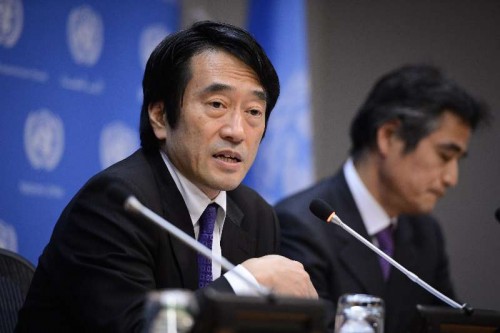
Despite recent slayings of two Japanese citizens by the Islamic State (IS), Tokyo does not intend to abandon its post-World War II pacifism and chooses instead to increase its non-military humanitarian assistance to the Middle East, Yasuhisa Kawamura, chief spokesman for Japan’s foreign ministry said here Thursday.
“We will never give in to terrorism and we will not change our past path of peaceful contribution to the region,” Xinhua quoted Kawamura as telling reporters here at the UN Headquarters.
Asked if Japan might consider putting “boots on the ground” to fight terrorism in the Middle East, he replied, “At this point in time, we are not going to consider such an option. As I said before we will continue to provide non-military humanitarian assistance for countries that face the threat of terrorism or suffer from those outrageous activities.”
There had been some discussion lately in Japan, prior to the militants’ killing of the two men, to alter Article 9 of Japan’s Constitution which forbids military aggression. Japan’s military units are referred to as Self-Defence Forces.
The world is very much worried about the announced efforts of Shinzo Abe, who was re-elected late last year as Japan’s prime minister with a new mandate for another four years, to push forward a controversial constitutional revision.
At a press conference in Tokyo Dec 24, 2014, Abe admitted that the constitutional amendment, which he called a “historical challenge”, was not an easy job, saying he would try to build a consensus on the issue in the National Diet, the Japanese parliament, so as to gain support in both houses.
“Japan has been left shocked by the murders of the two Japanese nationals as well as a Jordanian pilot at the hand of terrorists,” he said in his opening statement, referring to the apparent burning to death of the pilot at the hands of IS militants earlier this week.
“Words cannot express the unbearable pain and sorrow that the bereaved families and people in the world feel for their loved ones, nor the strength of our condemnation for these impermissible and outrageous acts of terrorism,” the spokesman added.